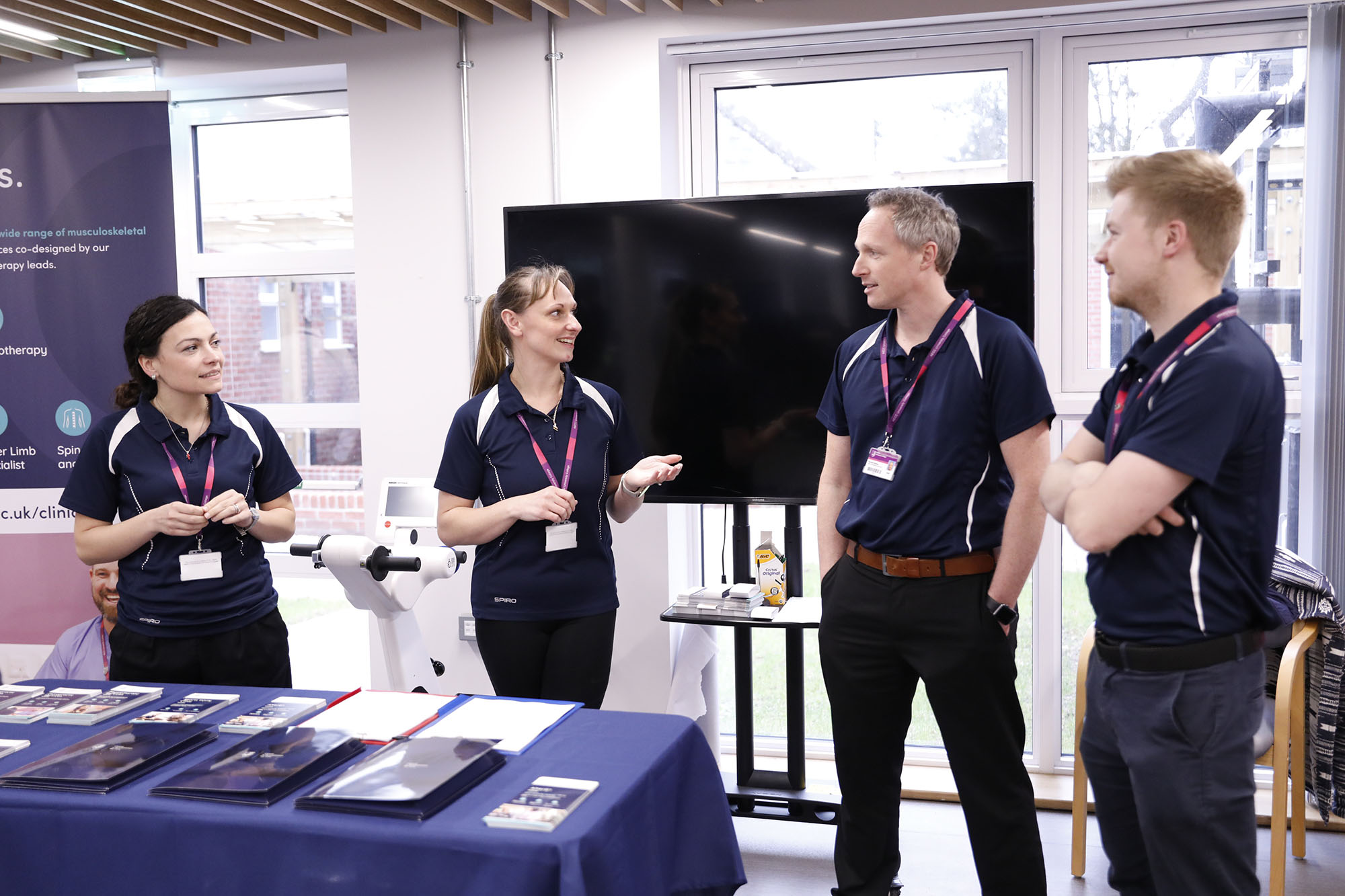Explainer: First Contact Practice at AECC University College

Richard Stanley is the Musculoskeletal and First Contact Practice Physiotherapy Clinical Lead of the Clinical and Rehabilitation Services at AECC University College. He heads up a team of four First Contact Practitioners based on campus.
His role combines First Contact Practice in local GP surgeries with working in Physiotherapy and Rehabilitation within the Integrated Rehabilitation Centre.
Richard explains the First Contact Practice service, and how he and his team implement the service locally:
“The core premise of First Contact Practice is about getting people the right care as early as possible, and supporting GP surgeries who are under enormous pressure.
“Our real emphasis is on getting patients to the right place, in front of the right health care professionals, and making every contact count.”
First Contact Practice Team at AECC University College
“First Contact Practice is being rolled out nationally by NHS England.
“First Contact Practice offers a musculoskeletal service that is based in Primary Care, within GP surgeries. If a patient contacts their GP with something like shoulder pain, back pain, or knee pain; they can be booked in to see a First Contact Physiotherapist.
“Here at AECC University College, we’re a team of four First Contact Physiotherapists. Our team is based in local GP surgeries in the Bournemouth East Collaborative Primary Care Network for 50% of our contracted hours. That includes five GP surgeries in our immediate local area.
“We see 21 patients a day, each for a 20-minute slot. We meet patients with musculoskeletal complaints, have a consultation with them, and assess them. We offer advice, guidance, diagnosis and a management plan, and can refer patients on for investigations or to other services in the same way that a GP would do.
“We might be able to give them exercises that we feel will help them, and if pain relief is required, we can work closely with our GP colleagues to provide that.
“We’ve seen a very successful start to the service – we had 523 patient contacts between December and the end of January.”
Opportunity for Physiotherapists
“If we can help our GP colleagues by seeing a certain percentage of their patients, then that’s a great thing.
“As Physiotherapists, we are well-placed to offer this service. Whilst GPs have an extremely varied and wide-ranging remit across medicine, we as MSK Physiotherapists have spent all of our careers focusing on musculoskeletal systems.”
Making Every Contact Count
“Making every contact count is a central aspect of First Contact Practice: this is known as the MECC Principle.
“The challenge for us lies in the diagnostic element. We are getting people started and underway with rehabilitation, if appropriate, or getting them to a medical review, or to the right investigations. That’s crucial to ensuring patients get the right care.
“We get 20 minutes to review a patient – that’s twice the amount of time that a GP gets. We get the opportunity to talk to the patient about advice, self-management and guidance on what’s wrong with them and why – rather than simply referring on to a Physiotherapist. Sometimes advice and guidance and self-management is the most appropriate thing.
“If the problem continues, or gets worse, the door is open in primary care. We have short waiting times for patients to be able to come back and see us.
“People are still used to wanting to see their GP; the GP has always been the first point of contact for everything. It’s a cultural change that is starting to happen; people are starting to phone up GP practices and asking to see the Physiotherapist if they have a musculoskeletal problem.
“We can manage a lot of people’s concerns within the session. Early intervention and management can be very helpful.”
Implementing First Contact Practice Locally
“A big part of ensuring First Contact Practice is a success is working hard to integrate ourselves within the different GP surgeries. We’re essentially a brand-new service to the Primary Care Network, looking to integrate ourselves into an existing service.
“Our contract got underway properly at the beginning of December and it’s been very successful so far. The GP surgeries have been great at making sure we are integrated into their surgeries.
“I really enjoy working with GPs. They have an extremely challenging and difficult job to do and they are very clear, level-headed people. I believe one of the key reasons for the success of the First Contact Practice service so far has been the sense of teamwork across the board to make sure it works.
“At no point have we felt uncertain about a patient and haven’t been able to find a GP to be able to go and talk to. We’ve developed plans for patients with GP colleagues; there have been patients that we have admitted straight from Clinic with support from the duty doctors; and we’ve had several occasions where GPs have medically reviewed patients as a result of us seeing them.
“As the Lead of the First Contact Practice Service at AECC UC, my job is made so much easier by having a fantastic team that I can trust so implicitly.”

Above: Richard Stanley

